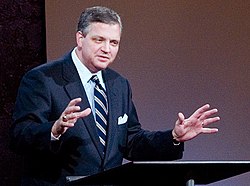A fabulous piece by Dr. Albert Mohler, President of the Southern Baptist Theological Seminary. In the Evangelical world, Mohler is considered one of the most thoughtful, stalwart, and down right smartest guys on the pulpit. Here's excerpts from his column titled "Mormonism, Democracy, and the Urgent Need for Evangelical Thinking." We pick up where he sets things straight regarding the "cult" issue:
 Mormonism does not claim to be just another denomination of Christianity. To the contrary, the central claim of Mormonism is that Christianity was corrupt and incomplete until the restoration of the faith with the advent of the Latter-Day Saints and their scripture, The Book of Mormon. Thus, it is just a matter of intellectual honesty to take Joseph Smith, the founder of Mormonism, at his word when he claimed that true Christianity did not exist from the time of the Apostles until the reestablishment of the Aaronic and Melchizedek priesthoods on May 15, 1829.
Mormonism does not claim to be just another denomination of Christianity. To the contrary, the central claim of Mormonism is that Christianity was corrupt and incomplete until the restoration of the faith with the advent of the Latter-Day Saints and their scripture, The Book of Mormon. Thus, it is just a matter of intellectual honesty to take Joseph Smith, the founder of Mormonism, at his word when he claimed that true Christianity did not exist from the time of the Apostles until the reestablishment of the Aaronic and Melchizedek priesthoods on May 15, 1829.
From a Christian perspective, Mormonism is a new religion, complete with its own scripture, its own priesthood, its own rituals, and its own teachings. Most importantly, those teachings are a repudiation of historic Christian orthodoxy — and were claimed to be so from the moment of Mormonism’s founding forward. Mormonism rejects orthodox Christianity as the very argument for its own existence, and it clearly identifies historic Christianity as a false faith.
The very subtitle of The Book of Mormon — Another Testament of Jesus Christ — makes one of Mormonism’s central claims directly and candidly: That we need another authority to provide what is lacking in the New Testament.
It is neither slander nor condescension to state clearly that Mormonism is not Christianity. Taking Mormonism on its own terms, one finds a comprehensive set of teachings and doctrines that are self-consciously set against historic Christianity. The larger world may be confused about this, but biblical Christians cannot make this error, for we are certain that the consequences are eternal.
Recommended
So, how do we move from this knowledge to the question of our social and political responsibility? Can a faithful Christian vote for a Mormon candidate?
Mohler answers:
[C]ompetence for public office is also an important Christian concern, as is made clear in Romans 13. Christians, along with the general public, are not well served by political leaders who, though identifying as Christians, are incompetent. The Reformer Martin Luther is often quoted as saying that he would rather be ruled by a competent Turk (Muslim) than an incompetent Christian. We cannot prove that Luther actually made the statement, but it well summarizes an important Christian wisdom.
Furthermore, we must be honest and acknowledge that there are non-Christians or non-evangelicals who share far more of our worldview and policy concerns than some others who identify as Christians. The stewardship of our vote demands that we support those candidates who most clearly and consistently share our worldview and combine these commitments with the competence to serve both faithfully and well.
Mohler concludes:
Given all this, we would expect that, under normal circumstances, Mormon voters will support candidates who most fully represent their worldview and concerns. Given the distribution of Mormons in the United States, this means that many Mormons (who would probably prefer to vote for a Mormon candidate), often vote for an evangelical or a Roman Catholic candidate. The reverse is also true. Evangelicals in many parts of the United States vote eagerly for Roman Catholic candidates with whom we share so many policy concerns, and this is true also in reverse. In an increasingly diverse America, we will be faced with very different choices than we have faced in the past.

























Join the conversation as a VIP Member